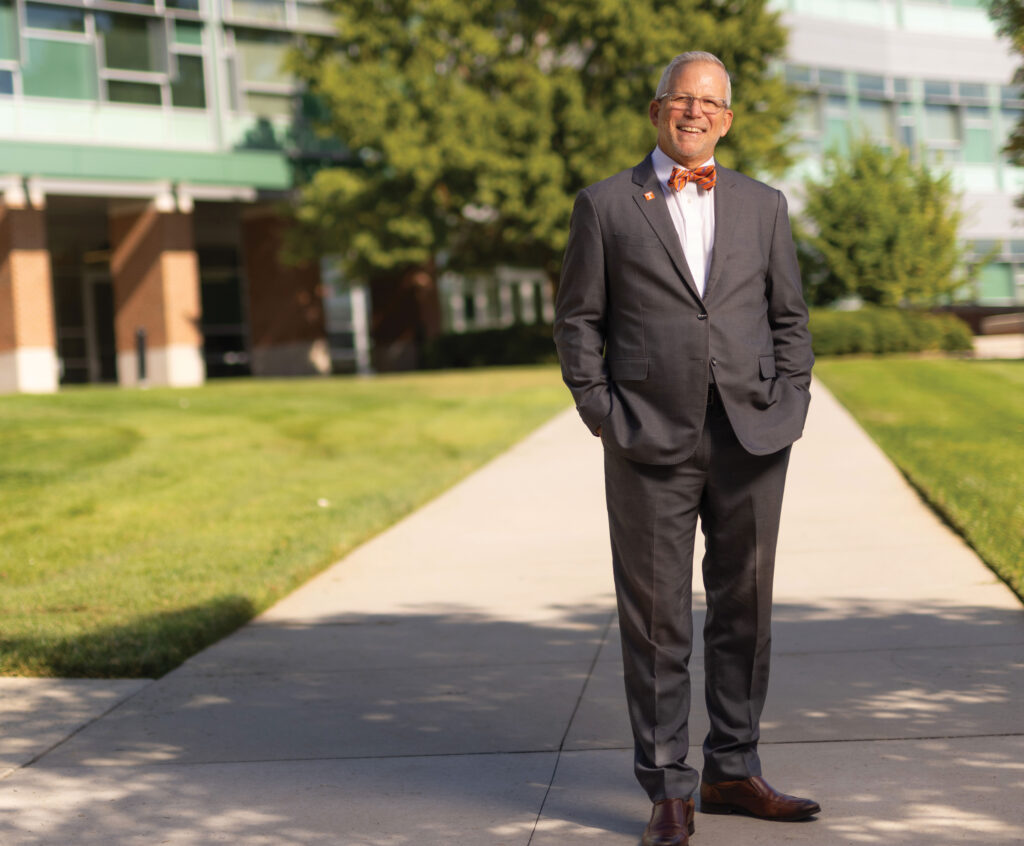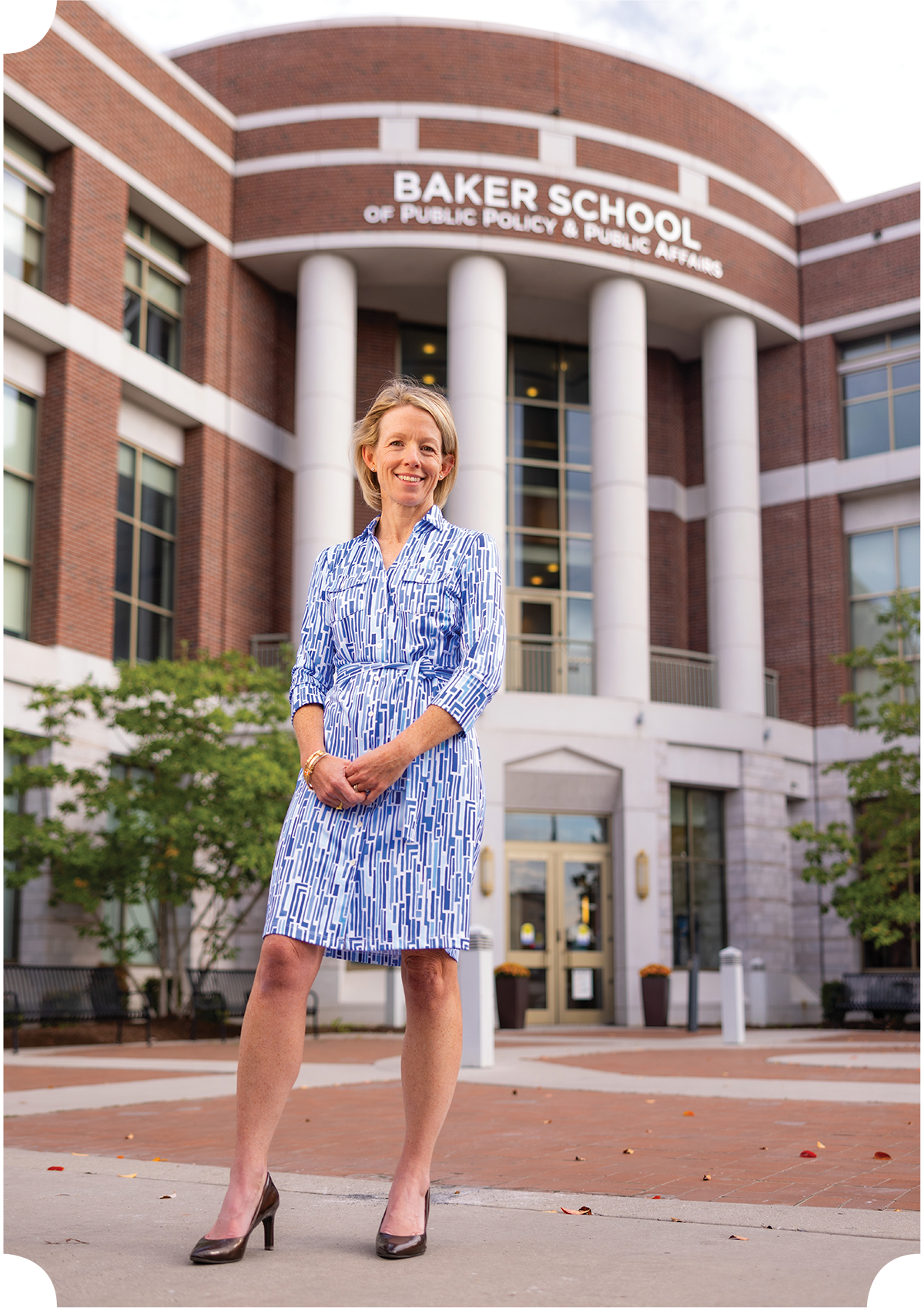For the first time in 50 years, the university has transformed its academic structure, establishing three new academic units to provide expanded opportunities for students and help serve the state of Tennessee and beyond.

Get to know what the future holds for Vols in the new College of Music, College of Emerging and Collaborative Studies, and Baker School of Public Policy and Public Affairs, and meet the leaders blazing new trails on Rocky Top.
College of Music
While music has long had a presence on UT’s campus—the Pride of the Southland Band was established in 1869—the program that would eventually become the College of Music was not founded until 1946, making its home in the Department of Fine Arts. In 1991 the Department of Music and the Department of Music Education (in what was then the College of Education) merged to create what would formally be named the School of Music in 1999.
With the elevation of the School of Music to a college in July, it became the only public college of music in the state and the Southeastern Conference. The change raises its profile and fosters its agility in creating innovative courses, curricula, and degree programs—developments that will allow for increased enrollment and a more holistic and customized experience for students, better preparing them to make their mark in the community and beyond.
Currently about 350 undergraduate and graduate students in the new college are exploring music through the lenses of analysis, business, composition, conducting, education, musicology, performance, and technology. That list is set to grow with the addition of new degree programs and partnerships that will make music students even more valuable in the rapidly changing music economy—a massive portion of which is anchored in Tennessee with roots music in the east, country in Nashville, and rhythm and blues in the west.
Curriculum additions
The college recently announced a partnership with Pellissippi State Community College that allows students in Pellissippi State’s Associate of Applied Science program in media technologies/audio production engineering to transfer into UT’s Bachelor of Arts program in music business administration. The partnership provides a pathway for students to broaden expertise in various areas of music and the music business. While Pellissippi State’s program focuses on hard skills on the technical side of music production and audio engineering,
UT provides courses in applied music, music theory and musicology, music business, accounting, management, entrepreneurship, business law, advertising principles, and finance. The resulting combination of skills will give students an advantage in the music industry job market.
Among other programs in the works are two new Bachelor of Arts degree programs: one in music, journalism, and electronic media and one in music, advertising, and public relations.
Meet the Dean
The college is led by Natalie L. Haslam Founding Dean Jeffrey Pappas, who began leading the School of Music in 2012 as director. He holds a bachelor’s degree in vocal performance from Northern Kentucky University, a master’s degree in choral conducting from the University of Illinois, and a doctorate in choral conducting and pedagogy from the University of Iowa.
During his tenure, Pappas has overseen the opening of the Natalie L. Haslam Music Center, the establishment of the school as an All-Steinway Institute, the creation of the music business administration degree, and $33 million in fundraising. He has been active with the National Association of Schools of Music, first as a board member and then as an executive committee member.
“Any elevation of an existing unit to a college is transformational, and my colleagues and I value the trust given to us with this move,” says Pappas. “But it is just another sign that UT is leading the way in higher education. When other music and arts units are unfortunately being reduced or cut at other institutions, this move shows the value and importance UT places in music and bucks these national trends. We are grateful for this confidence and look forward to a future where music continues to play a vital and relevant role in the lives of everyone our college interacts with.”

COLLEGE OF EMERGING AND COLLABORATIVE STUDIES
UT has broken the mold by establishing the College of Emerging and Collaborative Studies, which will serve as a catalyst for interdisciplinary programs and further UT’s mission as a modern land-grant university. CECS will act as an incubator and home for new degree programs on emerging topics and disruptive technologies, leveraging campus strengths across all colleges and disciplines. As they launch programs in emerging topics that are rapidly changing the future landscape of the workforce, CECS leadership will prioritize unique and bold partnerships with industries to develop and offer personalized relevant learning experiences to students.
Both undergraduate and graduate students will be able to take advantage of multidisciplinary courses, programs, and degrees offered in person and online. Thanks to the dynamic nature of CECS, the college will be able to respond to and develop offerings to address the impact of new and in-demand fields of study, such as data science, artificial intelligence, and cybersecurity, on other disciplines by leveraging current programs and collaborating with campus experts quickly and nimbly.
Many future job opportunities may not even exist at the time students enter college because of the accelerated change in the need for future talent. CECS will help students design their own careers and then help them develop the tools and future-oriented skills to jump-start that career. CECS will also offer a custom degree with stackable certificates developed with input from industry partners on future talent needs, further allowing students to personalize their degree paths and collaborate with students and faculty from all disciplines. Every semester, CECS students will have an opportunity to spend time in courses developed by multiple faculty and learn alongside students with different backgrounds and degree paths.
Getting Started
Currently, CECS oversees the intercollegiate data science minor and major. The CECS team is working with other faculty and units on campus to collaboratively develop several other intercollegiate programs, including certificates, minors, and majors on future workforce-oriented topics such as applied artificial intelligence and applied cybersecurity, human-smart systems interaction, and game design, among others, with plans to launch the first of these programs in fall 2024.
Meet the Dean
Leading this first-of-its-kind college is Dean Ozlem Kilic, who also serves as interim vice provost for academic affairs. Previously, she served as the associate dean of academic and student affairs in the Tickle College of Engineering and co-supervised the Heath Integrated Business and Engineering program in partnership with the Haslam College of Business. She was also instrumental in the launch of the intercollegiate data science minor and major, which was a collaboration between nine colleges, and served as their executive director. “CECS is at the forefront of education where disciplines collide and emerge,” says Kilic. “By leveraging campus expertise and strengths on emerging topics such as AI and cybersecurity and weaving these into our curriculum, our students will graduate ready to meet the needs of the future workforce.”
HOWARD H. BAKER JR. SCHOOL OF PUBLIC POLICY AND PUBLIC AFFAIRS
As the first and only school of public policy and public affairs at any public university in Tennessee, the Baker School is building on the legacy of the Howard H. Baker Jr. Center for Public Policy, established and named for the late senator and statesman Howard H. Baker Jr. (’49). The center began in 2003 with a mission to educate and promote research to further the public’s knowledge of our system of governance and highlight the critical importance of public service.

The new school is taking that mission even further by creating academic programs and degrees that will help produce public servants and civic leaders.
Over the past decade, the Baker Center shifted focus from serving as a museum, archive, and event space into operating as a public policy think tank. In the process, it began generating critical scholarship on challenges ranging from educational investments in Appalachian coal communities to substance use disorder and rural health disparities.
Through the new Baker School, the university hopes to foster in its students the attributes Senator Baker embodied, helping them become individuals who are motivated by a deep curiosity, eager to learn from others, profoundly interested in solving society’s greatest challenges, and prepared to light a path that inspires and challenges those who follow.
Academic Expansion
In 2017, the Baker Center established a minor in public policy analytics and has offered an increasing portfolio of curricular and co-curricular programming for students as part of a growing teaching mission. For 20 years, the center also facilitated the Baker Scholars interdisciplinary thesis program for students to conduct research on policy issues. Those programs will remain at the Baker School.
A few other existing academic programs will move to the new school, including the undergraduate major in public administration, the Master of Public Policy and Administration, and the dual JD–MPPA program. Starting from that foundation, the school will establish best-in-class academic programs that integrate its research strengths and the recently established Institute of American Civics, whose mission is to strengthen civic education and participation while reviving thoughtfulness, civility, and respect for opposing viewpoints in national discourse. The institute was created by the Tennessee General Assembly in 2022 with overwhelming bipartisan support.
Meet the Dean
Marianne Wanamaker was promoted from executive director of the Baker Center to dean of the new school. She joined the Haslam College of Business in 2009 and recently served for a year on the White House Council of Economic Advisers, first as senior labor economist and then as chief domestic economist. Wanamaker has served as a member of the Global Partnership for Artificial Intelligence, an international effort to promote research and cooperation on responsible AI adoption, and the Federal Workforce Policy Advisory Board. She is a research associate at the National Bureau of Economic Research in Cambridge, Massachusetts, and a research fellow at the Institute for Labor Economics in Bonn, Germany, and Stellenbosch University in South Africa.
“The Baker School has an enormous opportunity to invest in the next generation of civic leaders and to teach them to be part of the solution to our country’s biggest challenges,” says Wanamaker. “We are honored to carry Senator Baker’s legacy forward.”


1 comment
Leadership style guiding the team to success, much like a well-executed marketing plan.